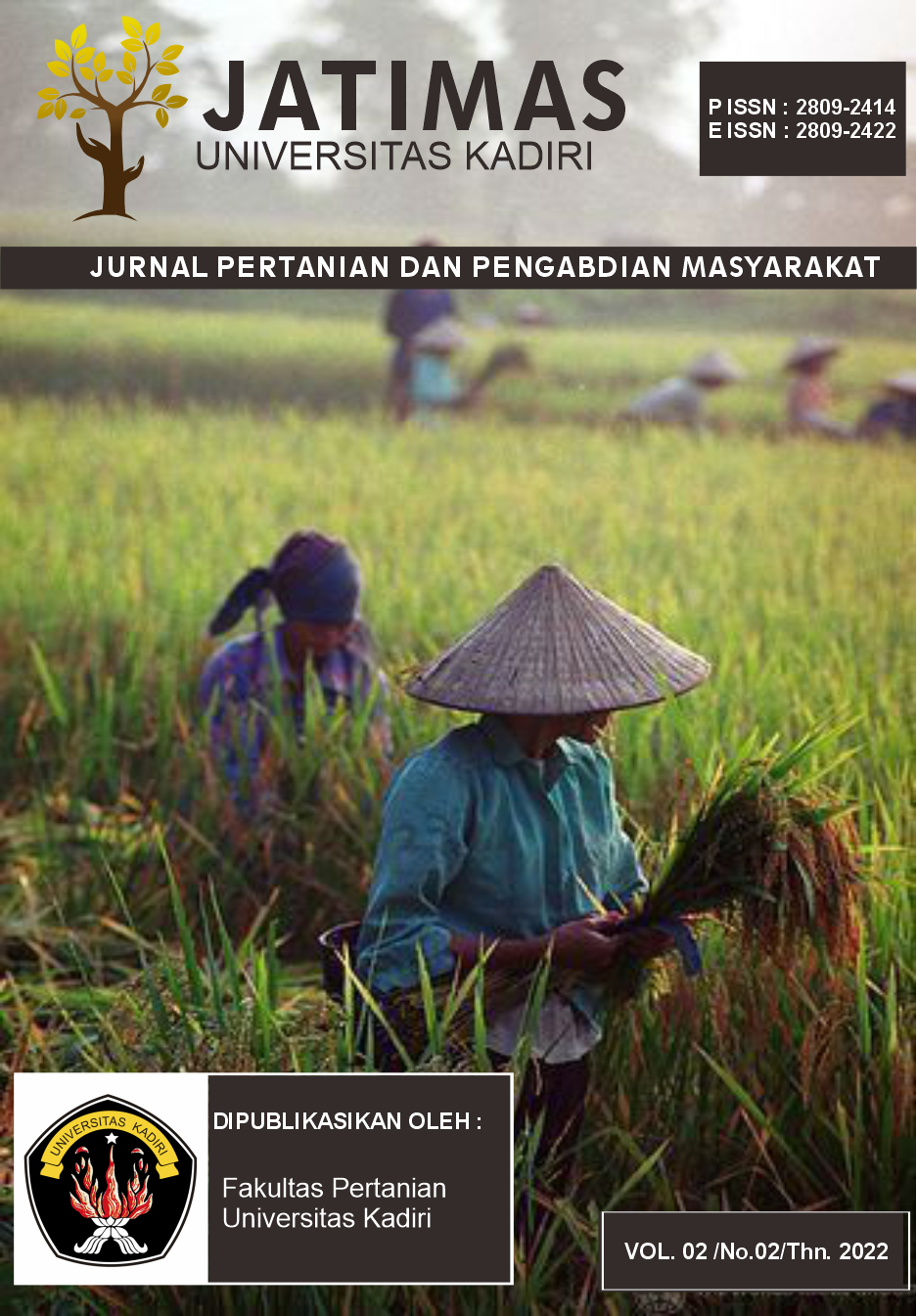Pengembangan Kegiatan Badan Usaha Milik (BUM) Desa Tambakromo Dalam Peningkatan Sumber Pendapatan Desa (PADES) Melalui Bank Sampah
DOI:
https://doi.org/10.30737/jatimas.v2i2.3483Keywords:
Environment, Rubbish, Waste BankAbstract
The issue of global problems in all countries, including Indonesia's regions, is waste. The accumulated waste produced is comparable to a population of 275 million people in 2022. Garbage is something left over from the use of various materials that have been used by humans but cannot decompose by themselves. Efforts to maintain and protect a clean and healthy environment, one of which is by building waste processing areas that provide economic value to the surrounding community. The waste bank works to collect waste from the district and sort it according to needs and value. This service was carried out in Tambakromo Village, with the target audience being women and youth. The purpose of this service was to make the village community aware of the existence of a waste bank. The method used in this service was to socialize the impact of community waste on the environment and assist in sorting community waste into goods with benefits and economic value. The results obtained from this service were increasing the income of village communities and strengthening women's empowerment activities and youth organizations to maintain a more beautiful environment.
Â
Isu permasalahan global di seluruh negara termasuk berbagai wilayah Indonesia merupakan sampah. Akumulasi limbah sampah yang dihasilkan sebanding oleh populasi 275 juta orang pada tahun 2022. Sampah adalah sesuatu sisa penggunaan dari berbagai bahan yang telah digunakan oleh manusia namun tidak dapat terurai dengan sendirinya. Upaya memelihara dan melindungi lingkungan yang asri, salah satunya dengan membangun kawasan pengolahan limbah sampah yang dapat dipergunakan kembali dan memberikan nilai ekonomis buat masyarakat sekitar. Bank sampah bekerja untuk menyalurkan sampah dari masyarakat yang telah dipilah sesuai kebutuhan dan masih dapat dimanfaatkan nilainya. Pengabdian ini dilakukan di Desa Tambakromo dengan sasaran khalayak ibu-ibu dan pemuda di desa tersebut. Tujuan pengabdian ini agar masyarakat desa sadar akan keberadaan bank sampah (waste bank). Metode yang digunakan dalam pengabdian ini ialah dengan mensosialisasikan dampak sampah masyarakat terhadap lingkungan dan pendampingan pemilahan sampah masyarakat untuk dijadikan barang yang memiliki manfaat dan nilai ekonomi. Hasil yang diperoleh dari pengabdian ini yaitu meningkatkan pendapatan masyarakat desa dan memperkuat kegiatan pemberdayaan perempuan dan organisasi kepemudaan untuk menjaga lingkungan hidup yang asri.
References
Andajani, W., Pamujiati, A. D., & Gunariyati, Y. N. (2021). Pengelolaan Sampah Terpadu Dan Bank Sampah Al-Ikhlas, di Kelurahan Rejomulyo, Kecamatan Kota, Kota Kediri. JATIMAS : Jurnal Pertanian Dan Pengabdian Masyarakat, 1(2), 152. https://doi.org/10.30737/jatimas.v1i2.2093
Aryawan, M., Rahyuda, I. K., & Ekawati, N. W. (2017). Pengaruh Faktor CSR (Aspek Sosial, Ekonomi, dan Lingkungan) terhadap Citra Perusahaan. E-Jurnal Manajemen Unud, Vo. 6(2), 604–633.
Chairani, I. (2020). Dampak Pandemi Covid-19 Dalam Perspektif Gender Di Indonesia. Jurnal Kependudukan Indonesia, 2902, Hlm. 39.
https://doi.org/10.14203/jki.v0i0.571
Hasnam, L. F., Syarief, R., & Yusuf, A. M. (2017). Strategy Development of Waste Banks in Depok Area. Jurnal Aplikasi Bisnis Dan Manajemen, 3(3), 407–416.
Kusuma Wardany, Reni Permata Sari, & Erni Mariana. (2020). Sosialisasi Pendirian “Bank Sampah†Bagi Peningkatan Pendapatan Dan Pemberdayaan Perempuan Di Margasari. Dinamisia : Jurnal Pengabdian Kepada Masyarakat, 4(2), 364–372. https://doi.org/10.31849/dinamisia.v4i2.4348
Muharram, M., & Supandji, S. (2022). Pendampingan Kegiatan Pembibitan Padi Sistem Dapog di BumDes Sosrohbahu Desa Rejeni Kabupaten Sidoarjo. JATIMAS : Jurnal Pertanian Dan Pengabdian Masyarakat, 2(1), 49.
https://doi.org/10.30737/jatimas.v2i1.2555
Probojati, R. T., Hadiyanti, N., Zulkarnain, A., Alfatin, M., & Lisanty, N. (2022). Pelatihan Pemanfaatan Limbah Botol Plastik Sebagai Wadah Media Tanam Di Desa Mojoroto Kelurahan Mojoroto Kota Kediri. J-ABDIPAMAS : Jurnal Pengabdian Kepada Masyarakat, 6(1), 27–32.
Shentika, P. A. (2016). Pengelolaan Bank Sampah di Kota Probolinggo. Jurnal Ekonomi Dan Ekonomi Studi Pembangunan, 8(1), 92–100. https://doi.org/10.17977/um002v8i12016p092
Siahaan, M. (2020). Dampak Pandemi Covid-19 Dalam Dunia Pendidikan. Jurnal Kajian Ilmiah, 1(1), 73–80. https://doi.org/10.31599/jki.v1i1.265
Yuliesti, K. D., Suripin, S., & Sudarno, S. (2020). Strategi Pengembangan Pengelolaan Rantai Pasok Dalam Pengelolaan Sampah Plastik. Jurnal Ilmu Lingkungan, 18(1), 126–132. https://doi.org/10.14710/jil.18.1.126-132
Downloads
Published
Issue
Section
License
Authors who publish in this journal agree to the following terms:
- Authors retain copyright with the work simultaneously licensed under a Creative Commons Attribution License (https://creativecommons.org/licenses/by-nc-nd/4.0/) that allows others to share the work with an acknowledgement of the work's authorship. Permitted third-party reuse is defined by the Creative Commons Attribution-NonCommercial-NoDerivs (CC BY-NC-ND). This permission allows users to copy and distribute the Article, provided this is not done for commercial purposes and further does not permit distribution of the Article if it is changed or edited in any way, and provided the user gives appropriate credit (with a link to the formal publication through the relevant DOI), provides a link to the license, and that the licensor is not represented as endorsing the use made of the work.
- Authors are able to enter into separate, additional contractual arrangements for the non-exclusive distribution of the journal's published version of the work (e.g., post it to an institutional repository or publish it in a book).
- Authors are permitted and encouraged to post their work online (e.g., in institutional repositories or on their website) prior to and during the submission process, as it can lead to productive exchanges, as well as earlier and greater citation of published work.
Deprecated: json_decode(): Passing null to parameter #1 ($json) of type string is deprecated in /home/ojs.unik-kediri.ac.id/public_html/plugins/generic/citations/CitationsPlugin.php on line 68



